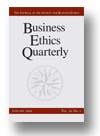My review essay on Donald Frey’s America’s Economic Moralists: A History of Rival Ethics and Economics (State University of New York Press) was published in Business Ethics Quarterly. Subscribers to BEQ can access the issue here.
Or my author-read audio version is at YouTube. My conclusion:

“America’s Economic Moralists is a good historical survey of mostly religious commentaries on economics. Frey’s work is in part a historical survey and in part a polemic against the autonomy individualists. In my judgment, Frey does a good job covering the important distinction between autonomy and relational economic moralities and many of the sub-debates therein. But there are more historically and philosophically significant themes that could also have been developed more fully, and Frey’s eagerness to advance the relational view and to slight the autonomy view sometimes gets the better of his skills as historian and philosopher.”
Hicks, Stephen R. C. 2012. “Review of Donald Frey’s America’s Economic Moralists: A History of Rival Ethics and Economics.” Business Ethics Quarterly 22.1, 186-193.
Professor Hicks,
Could you elaborate on what is meant by the autonomy individualists and the relational economic moralists? It sounds as if the term “autonomy individualists” is a collectivist smear against individualism, something similar to that smear term “atomistic individualism” (most often used by Conservatives). Also, it sounds as if the “relational” term is used to argue for a more communal or collectivist approach to economics; ie socialism-but-only-we-wont-call-it-that.
Thanks for a great blog. I’m reading through your intellectual history page. What a treasure trove of information.
I characterize Frey’s distinction this way in the review: “Relational moralists emphasize the connections we have to each other and define value essentially socially. Autonomy moralists, by contrast, emphasize individuals’ power and responsibility for choosing their own values and making their way in the world.”
Frey does not develop the distinction systematically.
Glad to know you’re finding the Intellectual History material useful.